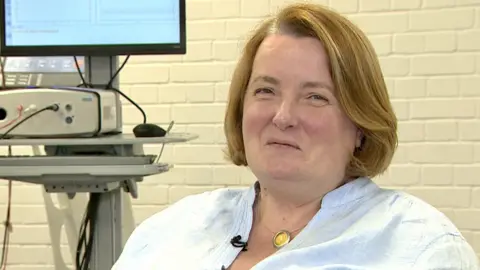Drumming helps pupils with autism overcome fear of failure - study
 Getty Images
Getty ImagesA study assessing the emotional benefits of drumming for teenagers with autism is being carried out in schools.
Research led by the University of Essex suggested adolescents who improved their drumming showed fewer signs of hyperactivity and inattention.
The project is being showcased at an exhibition and the study is being broadened out with analysis in schools.
Blondie drummer Clem Burke said: "The research involves the mental awareness of drumming."
 Richard Knights/BBC
Richard Knights/BBCThere are more than 1.5 million school children with special educational needs in England.
"We see a whole range of behavioural and emotional benefits to drumming," said Dr Ruth Lowry, the study's co-author.
"What we see is children who learn how to play the drums aren't afraid of making mistakes.
"When they stop and make a mistake in their drumming they simply pause, reset, and off they go, and it's no big deal, and we see that transferring into their school situation where they are happy to give things a go rather than have a fear of failure."
 Richard Knights/BBC
Richard Knights/BBCThe research was organised by the Clem Burke Drumming Project and funded by the Waterloo Foundation charity.
It involved experts from the campus in Colchester, the University of Chichester, King's College London and Hartpury in Gloucestershire.
A group of 36 teenagers were monitored which included some who received two individual drumming lessons per week for eight weeks and some who did not receive any.
MRI scans "clearly identified regions of the brain that respond to the stimulus of combining multiple limbs", researchers said.
The paper was published last year in the Proceedings of the National Academy of Sciences journal.
Meanwhile, children at five schools in Gloucester, Forest of Dean, Liverpool, Bedfordshire and West Sussex have been taking drumming lessons as part of a pilot study.
According to government statistics published in June, there were more than 1.5 million children with special educational needs in schools in England, an increase of 87,000 on 2022.
Burke, whose band has had six UK number one singles, said he wanted drumming to be included in England's national curriculum and said it could be a "game-changer" for children with learning difficulties.
"When you play music and accompany the rest of your band, you develop a non-verbal communication," he said.
"That is a very positive way of communicating, not verbally, but through the music."
Andrew Franklin, a drumming teacher from Essex who taught lessons for the study, told the BBC drumming could benefit "anybody of any age" and brought people "into the now".
The researchers are showcasing their study at the Summer Science Exhibition at the Royal Society in London from 4-9 July.

Follow East of England news on Facebook, Instagram and Twitter. Got a story? Email [email protected] or WhatsApp 0800 169 1830
